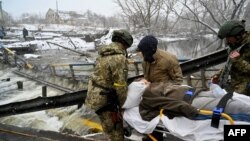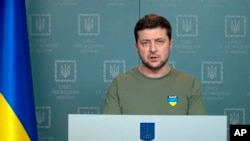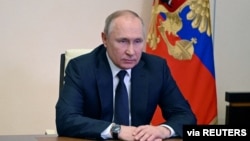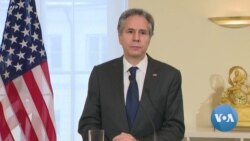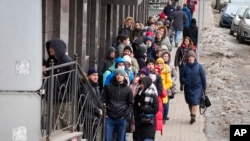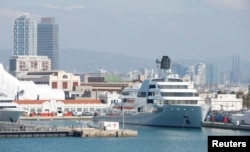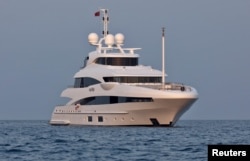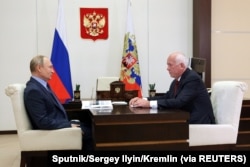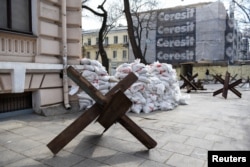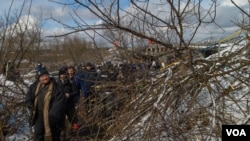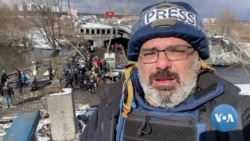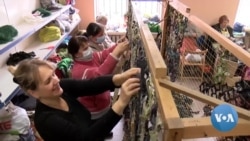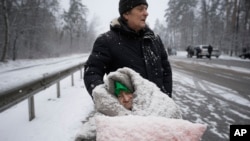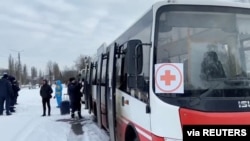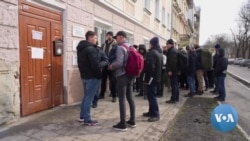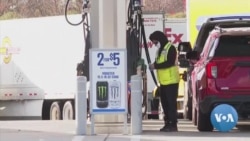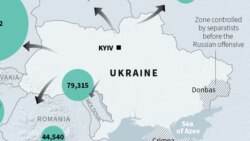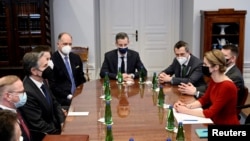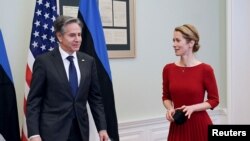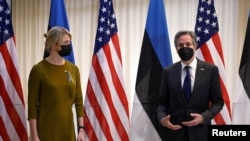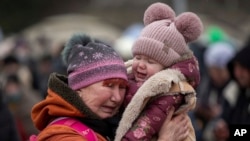For full coverage of the crisis in Ukraine, visit Flashpoint Ukraine.
For the latest developments of the conflict between Russia and Ukraine, all times EST:
11:30 p.m.: President Volodymyr Zelenskyy said he no longer expects Ukraine to be accepted into NATO and is focused on other ways to defend his country from Russian attacks.
“I have cooled down regarding this question a long time ago after we understood that … NATO is not prepared to accept Ukraine,” Zelenskyy told ABC News. “The alliance is afraid of controversial things and confrontation with Russia.”
To some observers, this signaled a willingness for negotiations with Russia which has long demanded that Ukraine abandon aspirations to join NATO. Zelenskyy said he is “ready for dialogue” in the interview but also called on both Europeans and Americans to increase their support for the country.
“We are a place in Europe, a place of freedom, a zone of freedom,” he said in the interview. “When the limits of rights and freedoms are being violated and stepped on, then you have to protect us. Because we will come first, you will come second.”
9:40 p.m.: Russia’s military failures in Ukraine, combined with crippling economic sanctions, are likely to spur Russian President Vladimir Putin to apply heavier and more indiscriminate force in his war against Kyiv, according to the latest public assessment by U.S. intelligence officials.
The officials painted a bleak picture for Ukraine Tuesday during testimony before Congress on the U.S. intelligence community’s annual Worldwide Threat Assessment, warning that despite mounting a fierce and often effective resistance, a growing number of cities will face growing desperation. VOA's Jeff Seldin has more.
9:05 p.m.: Fact checking Russian Military's So-Called Precision Strikes in Ukraine.
8:20 p.m.: Maj. Gen. Borys Kremenetskyi, Ukraine’s defense attaché to the U.S., said more air defenses is the priority to Ukraine now.
“It can be ground based air defense systems. It can be fighter jets, whatever possible,” he said in an interview with The Associated Press after a meeting at the Pentagon. He said many countries have Russian-made air defense systems that Ukrainians know how to use.
He said they also need anti-tank, anti-armor weapons and ways to defend their coast against Russian ships in the Black Sea.
7:49 p.m.: President Joe Biden on the Ukrainian people:
6:51 p.m.: U.S. Secretary of State Antony Blinken tells NATO allies their security is guaranteed.
5:45 p.m.: Short-wave radio is back.
5:40 p.m.: More Western corporations suspend operations.
5:25 p.m. The Department of State reissued the Travel Advisory for Ukraine to update information regarding the current security situation and remind U.S. citizens that they should not travel to Ukraine. The updated Travel Advisory gives specific instructions to those U.S. citizens who choose to travel to Ukraine despite the Travel Advisory. This update replaces the previous Travel Advisory issued on February 28, 2022.
4:30 p.m. Russia's central bank on Tuesday announced citizens with foreign currency accounts would not be allowed to withdraw more than $10,000 until September 9 and said banks could not sell hard currency, Reuters reports.
The bank, which earlier in the day announced a series of steps to help players, such as private pension funds and management companies, cope in a financial market hit by foreign sanctions, said in a statement that regardless of what foreign currency clients held in their accounts, withdrawals would be paid in U.S. dollars.
3:52 p.m.: A superyacht linked to Russian oligarch Roman Abramovich left Barcelona on Tuesday where it had been undergoing repairs in a local shipyard, Reuters reported. The 460-foot Solaris, which sails under a Bermuda flag according to monitoring site Marine Traffic, left Spanish company MB92's Barcelona shipyard late Tuesday, according to the same site. MB92 declined to comment.
The superyacht, which was built in a German shipyard and first took to the sea early last year, is one of a string of yachts owned by Abramovich, according to reports in luxury goods publications SuperYachtFan, SuperYacht Times and Forbes.
Abramovich, who last week put Chelsea Football Club up for sale and promised to donate money from the proceeds to help victims of the war in Ukraine, has not been the target so far of any sanctions over Moscow's invasion. A spokeswoman for Abramovich said: "We never comment on the movements of the yacht or any other vehicles or vessels."
French authorities last week took into temporary custody four cargo vessels and one luxury yacht linked to Russian oligarchs as the United States and other governments ramped up sanctions on Russia's super-rich with links to President Vladimir Putin. At least five other superyachts owned by Russian billionaires were anchored or cruising in the Maldives last week, an island nation in the Indian Ocean with no extradition treaty with the United States.
There are currently three other yachts reportedly tied to Russian oligarchs at the Barcelona shipyard, according to Marine Traffic. One of them is related to Sergei Chemezov, chief of Russian state aerospace and defense conglomerate Rostec, who was sanctioned last week by the United States. The other two are understood to belong to Russian oligarchs who have not been sanctioned - Andrey Molchanov, the main shareholder in Russian homebuilder LSR, and metals magnate Mikhail Prokhorov. Another superyacht, named Eclipse, which is also reportedly owned by Abramovich, was in Barcelona last autumn and is now in the Caribbean Sea near the British Virgin Islands.
3:41 p.m.: Hundreds of residents of Ukraine’s port city of Odesa have been working together to strengthen defenses against approaching Russian forces. Some welders made steel spikes called “hedgehogs” arrayed with razor wire to stop military vehicles from entering the city. The local yacht club organized the filling of sandbags for barricades and fortifications. By Tuesday, Odesa was facing food shortages and many people were leaving the city in anticipation of a Russian assault. Radio Free Europe/Radio Liberty has this report.
3:25 p.m.: The U.N.’s International Atomic Energy Agency (IAEA) raised concerns about safe management of the Chernobyl Nuclear Power Plant in Ukraine on Tuesday. In an official statement, IAEA said the same shift of 210 technical personnel and guards have been working there since Russian forces took control of the site 13 days ago.
Staff have access to food and water, and medicine to a limited extent, the Ukrainian regulator told IAEA. However, the situation for staff was worsening, it added.
“I’m deeply concerned about the difficult and stressful situation facing staff at the Chornobyl nuclear power plant and the potential risks this entails for nuclear safety,” said IAEA Director General Rafael Mariano Grossi. “I call on the forces in effective control of the site to urgently facilitate the safe rotation of personnel there,” he added.
3:07 p.m.: Poland is ready to deploy all its MIG-29 jets to Ramstein Air Base in Germany and put them at the disposal of the United States, according to a statement released by the Foreign Ministry Tuesday. Poland also requested the United States to provide it with used aircraft with corresponding operational capabilities. The Polish government urged other NATO members that own planes of that type to do the same.
3:02 p.m.: Explainer: What does a U.S. ban on Russian oil accomplish?
2:59 p.m.: The U.S. is banning all imports of Russian oil and gas, President Joe Biden announced Tuesday — a move that he said "will deal another powerful blow to Putin's war machine" as the Russian army continues its assault on Ukraine. VOA’s White House Correspondent Anita Powell has the details.
2:47 p.m. U.S. Secretary of State Antony Blinken and French President Emmanuel Macron compared notes Tuesday on ongoing diplomacy to diminish the violence in Ukraine and bring the Kremlin’s war to a halt. VOA’s State Department Correspondent Nike Ching shared the statement on Twitter.
2:40 p.m. Irpin Humanitarian Corridor in Pictures
2:03 p.m. VOA’s Yan Boechat reports from Irpin near the Ukrainian capital Kyiv, where blasts could be heard in the distance as civilians tried to evacuate Tuesday. Boechat reports that others in the area remain in hiding.
1:34 p.m. Resistance to the Russian invasion of Ukraine takes many forms. For some people in the Donetsk region, it means flooding their local volunteer center to create supplies for Ukrainian soldiers fighting the Russians. VOA's Yaroslava Movchan has the story, narrated by Anna Rice.
1:21p.m. : Russia’s invasion of Ukraine has highlighted internal divides within Mideast nations, according to The Associated Press. Political elites closely allied with the West are wary of alienating Russia or the U.S. and Europe. But other forces — from Shiite militia factions in Iraq, to Lebanon's Hezbollah group and Houthi rebels in Yemen — vocally support Russia against Ukraine.
12:52 p.m. : Ukraine’s President Volodymyr Zelenskyy addressed Britain’s Parliament Tuesday. He was greeted with a standing ovation as he prepared to make his remarks via video link. Zelenskyy appealed to Britain to do more to help his country battle Russia and punish what he called a "terrorist state," striking a defiant tone that Ukraine would fight on, no matter what the cost, according to Reuters. “The question for us now is to be or not to be,” Zelensky said. “I can give you a definitive answer: It’s definitely to be.” Following Zelenskyy’s address, Britain’s Prime Minister Boris Johnson said his country would continue to support Ukraine with military and humanitarian assistance, and continued sanctions against Russia. The prime minister's office streamed the speech live on Twitter.
12:48 p.m.: Britain's BBC on Tuesday said it would resume English language reporting in Russia after it suspended its coverage, according to Reuters. On March 4, the BBC said it had paused its reporting in Russia after parliament passed a law there that could impose a jail term of up to 15 years for anyone found to be intentionally spreading "fake" news. "We have considered the implications of the new legislation alongside the urgent need to report from inside Russia. After careful deliberation we have decided to resume English language reporting from Russia this evening (Tuesday 8 March)," the BBC said in a statement. "We will tell this crucial part of the story independently and impartially, adhering to the BBC’s strict editorial standards. The safety of our staff in Russia remains our number one priority."
12:24 p.m.: Britain announced Tuesday it will phase out Russian oil imports during the course of the year, in response to Russia’s illegal invasion of Ukraine, choking off one of Moscow’s valuable sources of income, reports VOA’s Nike Ching.
12:11 p.m.: “The European Commission on Tuesday presented a plan to cut Russian gas imports by two thirds this year, steeply reducing — but not severing — energy ties to Moscow,” the Washington Post reported. “The proposal, to be discussed by leaders at a summit in Paris this week, is a dramatic shift for a bloc that remains heavily reliant on relatively cheap and abundant Russian energy. But it falls short of the full-scale boycott that some have called for in response to Russia’s invasion of Ukraine,” the newspaper added. The EC presented its plan on the same day that U.S. President Joe Biden announced he is banning all Russian oil and gas imports, in a move intended to punish Russia's leaders for invading Ukraine.
11:54 a.m.: U.N. and international aid agencies are calling for an end to hostilities in Ukraine as the number of civilian casualties grows and more people flee in terror to safety in neighboring countries. The situation in parts of Ukraine have been described as “apocalyptic” as people run out of essential supplies. Aid agencies say priority needs include emergency shelter, health care, food, water and sanitation, and psychosocial support to help people deal with what aid groups call an epidemic of trauma and grief. VOA’s Lisa Schlein has this report.
11:36 a.m.: U.S. President Joe Biden announced Tuesday that he is banning Russian oil and gas imports, in order to hold Russia accountable for its “unprovoked and unjustified war on Ukraine,” VOA White House Bureau Chief Patsy Widakuswara reports.
“We’re moving forward with this ban, understanding many of our European allies and partners may not be in a position to join us,” Biden said during a press conference.
“Defending freedom is going to cost us in the United States. Republicans and Democrats alike understand this,” Biden said.
“Russia’s aggression is costing us all, and it’s no time for profiteering or price gouging,” he warned.
“This crisis should motivate us to accelerate the transition to clean energy,” Biden said. “Tyrants like Putin won’t be able to use fossil fuels as weapons against other nations.”
10:55 a.m.: Humanitarian crisis on Day 13 after Russia invaded Ukraine in Pictures
10:46 a.m.: U.S. Director of National Intelligence Avril Haines said on Tuesday that Russian President Vladimir Putin is unlikely to be deterred and may escalate the assault on Ukraine, despite setbacks in Ukraine and economic hardships resulting from international sanctions. “Our analysts assess that Putin is unlikely to be deterred by such setbacks and instead may escalate,” she told a House of Representatives hearing on global threats. VOA's National Security Correspondent Jeff Seldin is following the testimony of Haines and others as the U.S. House Permanent Select Committee on Intelligence holds its annual worldwide threats hearing.
10:42 a.m.: Ukrainians in the eastern city of Sumy were evacuating on buses amid a 12-hour-long ceasefire in that area, The Associated Press reports. Videos Tuesday showed people boarding buses, and multiple buses marked with a red cross driving along a snowy road.
Ukrainian Deputy Prime Minister Iryna Vereshchuk said both sides agreed to a ceasefire from 9 a.m. to 9 p.m. for the evacuation of civilians from Sumy. Those leaving include foreign students from India and China, she said. The safe corridors were agreed on by Ukrainian and Russian officials during their third round of direct talks March 7. More talks are expected.
The Russian Defense Ministry has said civilians will be allowed to also leave the southern port city of Mariupol and the capital Kyiv. The governor of the Kyiv Region, which surrounds the capital, said Ukraine was making arrangements to get people out of Irpin, which has been cut off from electricity, water and heat for four days. In Mariupol, an estimated 200,000 people – nearly half its population – are hoping to flee as hospitals there face severe shortages of antibiotics and painkillers. An official with Ukraine’s presidential office says humanitarian aid is being sent to the city.
Ukrainian President Volodymyr Zelenskyy called for the expansion of humanitarian corridors on Tuesday. Russia’s ambassador to the U.N. suggested that humanitarian paths could give people a choice in where they want to go. Earlier offers from Russia indicated that humanitarian corridors would lead only to Russia or Belarus.
10:27 a.m.: Jailed Russian opposition politician Alexey Navalny has again called for protests against Moscow's unprovoked invasion of Ukraine, saying the response of Russians to the war "will largely define Russia's place in the history of the 21st century."
Navalny, the Kremlin critic who is currently serving a 2 1/2-year sentence on what his supporters and Western legal analysts call a trumped-up fraud charge, wrote on Twitter on March 8 that anger against the war was building inside Russia and "the anti-war momentum will keep growing across the society, so the anti-war protests should not be halted under any circumstances."
10:16 a.m. : Americans and Canadians are among the thousands of volunteers responding to Ukrainian President Volodymyr Zelenskyy’s plea for help fighting the Russian invasion. VOA’s Maxim Moskalkov reports.
10:07 a.m.: Thirteen days into a brutal war in Ukraine and Russian President Vladimir Putin has failed to subjugate Ukraine. He appears no nearer to replacing its defiant government with a puppet regime. An out-gunned Ukraine has defied widespread pre-war predictions that it wouldn’t be able to hold out for long against superior Russian forces, and the Kremlin now faces the prospects of a prolonged battle that’s sparking a debate among Western officials and independent analysts about whether the invasion of Ukraine may mark the beginning of the end of Vladimir Putin. VOA’s Jamie Dettmer has the story.
10:00 a.m.: The U.S. House Permanent Select Committee on Intelligence will hold its annual worldwide threats hearing Tuesday morning. The purpose is to hear testimony from Intelligence Community leaders about the current security threats that face the United States and its allies. The open hearing will be followed by a classified hearing at 1:30 p.m. CIA Director William Burns, FBI Director Christopher A. Wray, Director of National Intelligence Avril Haines and other senior officials are expected to appear, according to the Washington Post, which said they are likely to face questions about Ukraine, North Korea’s recent missile test, and Iran’s nuclear program.
9:43 a.m.: The United Nations Educational, Scientific and Cultural Organization (UNESCO) released a progress report Tuesday, detailing efforts to protect cultural properties in Ukraine. The organization said it is in contact with Ukrainian cultural professionals and institutions and continues to assess the situation, following Russia’s invasion.
“We must safeguard the cultural heritage in Ukraine, as a testimony of the past but also as a catalyst for peace and cohesion for the future, which the international community has a duty to protect and preserve,” stated Audrey Azoulay, UNESCO Director-General, at the start of the conflict.
UNESCO says it is in contact with Ukrainian authorities to mark cultural sites and monuments with the distinctive “Blue Shield” emblem of the 1954 Hague Convention for the Protection of Cultural Property in the Event of Armed Conflict to avoid deliberate or accidental damages.
UNESCO, with its partner UNITAR (United Nations Institute for Training and Research), also analyses satellite imagery for priority sites, which are endangered or already impacted, in order to assess damage, the statement said.
9:20 a.m.: U.S. President Joe Biden will make an announcement at 10:45 a.m. EST about actions to continue to hold Russia accountable for its “unprovoked and unjustified war on Ukraine”, according to the White House. VOA’s Patsy Widakuswara will monitor.
Watch the announcement at 10:45 a.m. EST:
9:13 a.m.: The Norwegian Refugee Council (NRC) on Tuesday launched its humanitarian response plan for the next six-months, aiming to reach 800,000 people inside Ukraine and the neighboring countries of Poland, Romania and Moldova. It is appealing to donors for $82 million to meet the costs of the operation, the NRC said in a press statement.
“Every second the war forces a person to flee across Ukraine’s borders, and countless are displaced within the country,” said Jan Egeland, Secretary General of the NRC. “This is the fastest-growing displacement crisis I have witnessed in my 35 years as a humanitarian worker, and it is urgent to get assistance quickly into the worst affected areas,” he added.
“We appeal to donors to dig deep into their pockets to find new funding for people affected by the armed conflict in Ukraine, but not take resources from other crises. Human suffering is at unprecedented levels across the world - from Afghanistan to Central Sahel - and Ukraine is the latest in a long list of crises with record humanitarian needs,” said Egelan
8:51 a.m.: International Women's Day, marked each year on March 8, is a global day to celebrate women, but many fleeing Ukraine feel only the stress of finding a new life for their children as husbands, brothers, and fathers stay behind to defend their country from Russia's invasion. As The Associated Press reports, Ukrainian women refugees find themselves in “some kind of terrible dream.”
8:32 a.m.: U.S. First Lady Jill Biden released a statement Tuesday to mark International Women's Day, making special mention of women caught in the conflict between Russia and Ukraine. "To our sisters from Ukraine who are fighting to keep their country free and their families alive: We stand with you in solidarity," she said. "To our sisters in Russia who are protesting and speaking out against the invasion at great personal risk: We see your courage," Biden added.
8:15 a.m.: A growing number of Western businesses are either halting operations in Russia or exiting altogether over that country’s military incursion of neighboring Ukraine, reports VOA News.
7:43 a.m.: World leaders are feverishly trying to extinguish the conflict in Ukraine, as warring delegations prepare to meet for another round of talks. But in Washington, all eyes are on the gas pump as Russian sanctions send prices to near-record highs. VOA’s Anita Powell reports from the White House.
7:31 a.m.: Shell announced Tuesday its intent to withdraw from all Russian oil and gas operations. As an immediate first step, Shell is halting spot purchases of Russian crude oil, shutting service stations, and ending aviation fuel and lubricant operations in Russia, the company said in a tweet.
Shell Chief Executive Officer, Ben van Beurden, said in a company statement published online March 8, "We are acutely aware that our decision last week to purchase a cargo of Russian crude oil to be refined into products like petrol and diesel – despite being made with security of supplies at the forefront of our thinking – was not the right one and we are sorry."
He added, "As we have already said, we will commit profits from the limited, remaining amounts of Russian oil we will process to a dedicated fund. We will work with aid partners and humanitarian agencies over the coming days and weeks to determine where the monies from this fund are best placed to alleviate the terrible consequences that this war is having on the people of Ukraine."
7:12 a.m. : In an article titled "Putin's Iron Fist vs. Zelensky's Moral Clarity," The Harvard Gazette interviewed faculty historian Nancy Koehn, author of "Forged in Crisis: The Power of Courageous Leadership in Turbulent Times." She compares the two wartime leaders and analyzes the broader messages they are sending to the world.
7:00 a..m.: The U.N. refugee agency said Tuesday more than 2 million people have fled Ukraine since Russia launched its invasion on February 24. More than half have gone to Poland.
6:30 a.m.: U.S. Secretary of State Antony Blinken visited Estonia on Tuesday, the latest stop to demonstrate support for NATO allies in eastern Europe and discuss the response to Russia’s invasion of Ukraine. Blinken said the United States and NATO “are prepared to meet any threat from any direction it comes.” He called on Russia to allow humanitarian access for civilians in Ukraine, and said Ukraine’s allies will do “everything we can” to ensure Ukrainians have what they need to defend themselves.
“This is President Putin’s war to subjugate a sovereign, democratic country. And until he ends it, the world will hold him accountable,” Blinken said.
6:13 a.m.: Jodep Borrell, the European Union’s foreign policy chief, said Tuesday the EU should use a “broader toolbox” to curb the spread of disinformation to protect democracies from foreign interference, citing Russian propaganda and state-owned media such as Russia Today.
“I will propose a new mechanism that will allow us to sanction those malign disinformation actors,” Borrell said.
5:30 a.m.: As much of the world celebrates International Women’s Day on Tuesday, hundreds of thousands of Ukrainian women are displaced from their homes, fleeing a Russian inspired war in their homeland. A decree by Ukraine’s government that prohibits men 18 to 60 years of age from leaving the country means that most of those fleeing Ukraine are women and children.
The number of people fleeing Ukraine since the war began last week has reached 2 million Tuesday, according to the U.N. refugee agency, in what they called Europe’s fastest-growing refugee crisis since World War II.
Most refugees are seeking safety in Poland — more than 1 million had entered the country as of Monday — while some 180,000 had crossed Ukraine's border into Hungary.
Ukraine and Russia agreed to allow civilian evacuations from some areas on Tuesday.
4:47 a.m.: Filippo Grandi, the U.N. high commissioner for refugees, said the number of refugees who have left Ukraine following Russia’s invasion has reached two million on Tuesday.
4:00 a.m.: The Ukrainian ministry of foreign affairs called on Russia Tuesday to uphold ceasefire during the evacuation of Sumy.
3:30 a.m. Ukraine’s government said Tuesday it will offer financial assistance to citizens in places where there is heavy fighting. The State Service of Special Communications and Information Protection of Ukraine said 6,500 Ukrainian Hryvnia can be paid to “hired employees, for whom single social contribution is paid, as well as to individual entrepreneurs of all groups.”
3:00 a.m.: VOA’s national security correspondent Jeff Seldin reports on Russia’s efforts to sway the opinions of people. Just like its military advance, the Kremlin’s efforts to dominate the information environment have not gone according to plan, although experts say Moscow still has plenty of tricks up its sleeve.
2:40 a.m.: Civilians are set to start leaving the Ukrainian city of Sumy on Tuesday under an agreement with Russia on the establishment of a “humanitarian corridor,” Ukrainian Deputy Prime Minister Iryna Vereshchuk said, Reuters reports.
“It has been agreed that the first convoy will start at 10 a.m. (0800 GMT) from the city of Sumy. The convoy will be followed by the local population in personal vehicles,” Vereshchuk said in a televised statement.
2:18 a.m.: In a new report released Tuesday, the advocacy group Human Rights Watch said Russian forces “violated their obligations under international humanitarian law not to conduct indiscriminate or disproportionate attacks that harm civilians.”
1:38 a.m.: A groundbreaking law enabling New Zealand to freeze the assets of those associated with Russia is expected to pass this week. The new Russia Sanctions Bill — in response to its invasion of Ukraine — would allow authorities to target individuals, services, companies and assets. For VOA, Phil Mercer reports from Sydney.
Additionally, Australia’s Ministry for Foreign Affairs issued a statement Tuesday announcing further sanctions on Russia’s military commanders and those it says are responsible for state propaganda and disseminating disinformation.
The measure targets 10 people Australia says are “of strategic interest to Russia” and have been “driving and disseminating false narratives about the “de-Nazification” of Ukraine, making erroneous allegations of genocide against ethnic Russians in eastern Ukraine, and promoting the recognition of the so-called Donetsk People’s Republic and Luhansk People’s Republic as independent,” the ministry said in the statement.
12:30 a.m.: The World Bank approved $723 million in financial support for Ukraine. The package voted on by the bank’s board of executive directors includes $489 million in loans and guarantees, $134 million in grant financing and $100 million in parallel financing. The money is slated to help the Ukrainian government pay wages to hospital workers, pensions for the elderly and fund social programs for people at risk, the bank said in a statement.
The bank said it is working to create an additional $3 billion support package for Ukraine and will help support neighboring countries taking in refugees.
“The World Bank Group is taking quick action to support Ukraine and its people in the face of the violence and extreme disruption caused by the Russian invasion,” said World Bank President David Malpass in a statement. “The World Bank Group stands with the people of Ukraine and the region. This is the first of many steps we are taking to help address the far-reaching human and economic impacts of this crisis.”
12:00 a.m.: The U.S. is refuting Russian claims that its military is “preventing war” in Ukraine instead of causing it.
“This is a flat out lie,” U.S. State Department spokesperson Ned Price tweeted. “Russia’s military operation is instigating a war in Ukraine. Ukraine does not want a war. #StopTheLies.”
Russia has tried to justify its invasion with various claims including saying it is protecting ethnic Russians in the country and is trying to “de-nazify” the country. Price referred to a statement by Russian Foreign Minister Sergei Lavrov who said: “The goal of Russia's special military operation is to stop any war that could take place on Ukrainian territory or that could start from there.”
Some information in this report came from The Associated Press, Reuters and Agence France-Presse.




